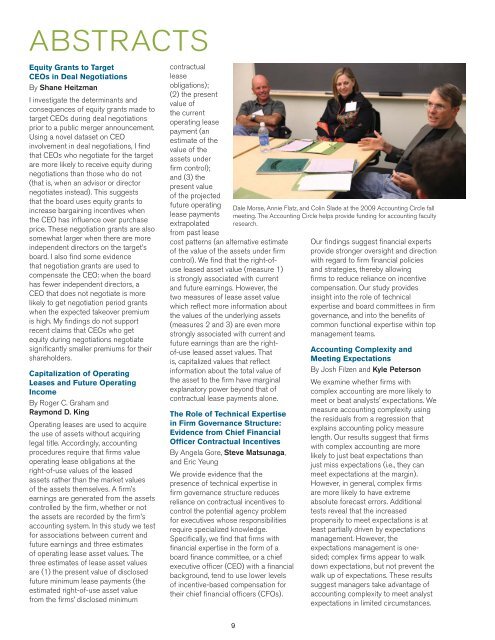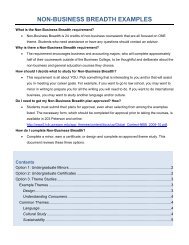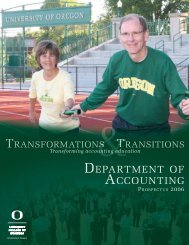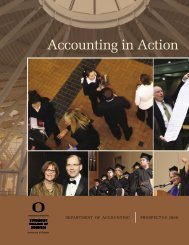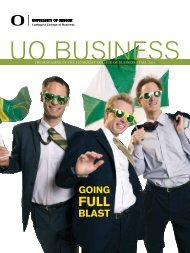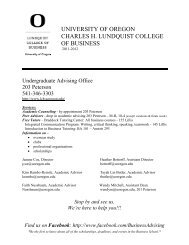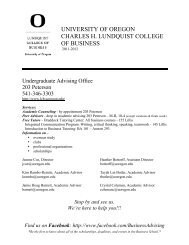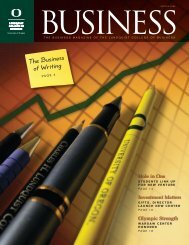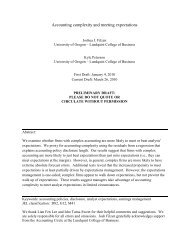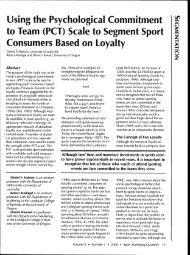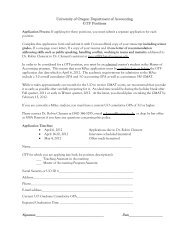BUILDING EXPECTATION - Lundquist College of Business ...
BUILDING EXPECTATION - Lundquist College of Business ...
BUILDING EXPECTATION - Lundquist College of Business ...
- No tags were found...
Create successful ePaper yourself
Turn your PDF publications into a flip-book with our unique Google optimized e-Paper software.
ABSTRACTSEquity Grants to TargetCEOs in Deal NegotiationsBy Shane HeitzmanI investigate the determinants andconsequences <strong>of</strong> equity grants made totarget CEOs during deal negotiationsprior to a public merger announcement.Using a novel dataset on CEOinvolvement in deal negotiations, I findthat CEOs who negotiate for the targetare more likely to receive equity duringnegotiations than those who do not(that is, when an advisor or directornegotiates instead). This suggeststhat the board uses equity grants toincrease bargaining incentives whenthe CEO has influence over purchaseprice. These negotiation grants are alsosomewhat larger when there are moreindependent directors on the target’sboard. I also find some evidencethat negotiation grants are used tocompensate the CEO: when the boardhas fewer independent directors, aCEO that does not negotiate is morelikely to get negotiation period grantswhen the expected takeover premiumis high. My findings do not supportrecent claims that CEOs who getequity during negotiations negotiatesignificantly smaller premiums for theirshareholders.Capitalization <strong>of</strong> OperatingLeases and Future OperatingIncomeBy Roger C. Graham andRaymond D. KingOperating leases are used to acquirethe use <strong>of</strong> assets without acquiringlegal title. Accordingly, accountingprocedures require that firms valueoperating lease obligations at theright-<strong>of</strong>-use values <strong>of</strong> the leasedassets rather than the market values<strong>of</strong> the assets themselves. A firm’searnings are generated from the assetscontrolled by the firm, whether or notthe assets are recorded by the firm’saccounting system. In this study we testfor associations between current andfuture earnings and three estimates<strong>of</strong> operating lease asset values. Thethree estimates <strong>of</strong> lease asset valuesare (1) the present value <strong>of</strong> disclosedfuture minimum lease payments (theestimated right-<strong>of</strong>-use asset valuefrom the firms’ disclosed minimumcontractualleaseobligations);(2) the presentvalue <strong>of</strong>the currentoperating leasepayment (anestimate <strong>of</strong> thevalue <strong>of</strong> theassets underfirm control);and (3) thepresent value<strong>of</strong> the projectedfuture operatinglease paymentsextrapolatedfrom past leasecost patterns (an alternative estimate<strong>of</strong> the value <strong>of</strong> the assets under firmcontrol). We find that the right-<strong>of</strong>useleased asset value (measure 1)is strongly associated with currentand future earnings. However, thetwo measures <strong>of</strong> lease asset valuewhich reflect more information aboutthe values <strong>of</strong> the underlying assets(measures 2 and 3) are even morestrongly associated with current andfuture earnings than are the right<strong>of</strong>-useleased asset values. Thatis, capitalized values that reflectinformation about the total value <strong>of</strong>the asset to the firm have marginalexplanatory power beyond that <strong>of</strong>contractual lease payments alone.Dale Morse, Annie Flatz, and Colin Slade at the 2009 Accounting Circle fallmeeting. The Accounting Circle helps provide funding for accounting facultyresearch.The Role <strong>of</strong> Technical Expertisein Firm Governance Structure:Evidence from Chief FinancialOfficer Contractual IncentivesBy Angela Gore, Steve Matsunaga,and Eric YeungWe provide evidence that thepresence <strong>of</strong> technical expertise infirm governance structure reducesreliance on contractual incentives tocontrol the potential agency problemfor executives whose responsibilitiesrequire specialized knowledge.Specifically, we find that firms withfinancial expertise in the form <strong>of</strong> aboard finance committee, or a chiefexecutive <strong>of</strong>ficer (CEO) with a financialbackground, tend to use lower levels<strong>of</strong> incentive-based compensation fortheir chief financial <strong>of</strong>ficers (CFOs).Our findings suggest financial expertsprovide stronger oversight and directionwith regard to firm financial policiesand strategies, thereby allowingfirms to reduce reliance on incentivecompensation. Our study providesinsight into the role <strong>of</strong> technicalexpertise and board committees in firmgovernance, and into the benefits <strong>of</strong>common functional expertise within topmanagement teams.Accounting Complexity andMeeting ExpectationsBy Josh Filzen and Kyle PetersonWe examine whether firms withcomplex accounting are more likely tomeet or beat analysts’ expectations. Wemeasure accounting complexity usingthe residuals from a regression thatexplains accounting policy measurelength. Our results suggest that firmswith complex accounting are morelikely to just beat expectations thanjust miss expectations (i.e., they canmeet expectations at the margin).However, in general, complex firmsare more likely to have extremeabsolute forecast errors. Additionaltests reveal that the increasedpropensity to meet expectations is atleast partially driven by expectationsmanagement. However, theexpectations management is onesided;complex firms appear to walkdown expectations, but not prevent thewalk up <strong>of</strong> expectations. These resultssuggest managers take advantage <strong>of</strong>accounting complexity to meet analystexpectations in limited circumstances.9


